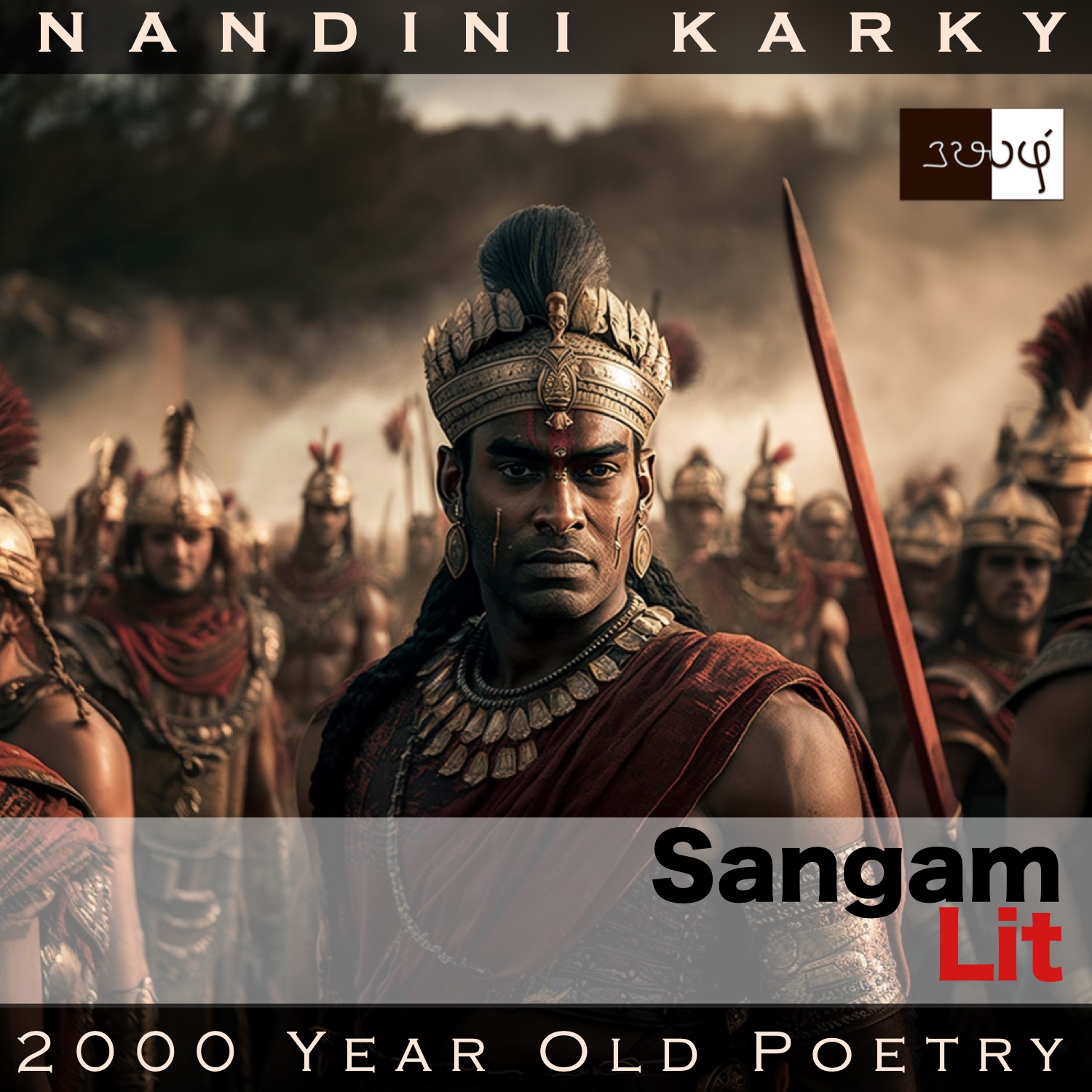Podcast: Play in new window | Download
Subscribe: Apple Podcasts | Spotify | Amazon Music | Android | iHeartRadio | Email | TuneIn | RSS | More
In this episode, we listen to arguments put forth against a king’s decision, as depicted in Sangam Literary work, Puranaanooru 213, penned about the Chozha King Koperunchozhan by the poet Pullaatroor Eyitriyanaar. Set in the category of ‘Paadaan Thinai’ or ‘Praise’, the verse reveals the influence held by poets in setting Sangam rulers on the right path.

மண்டு அமர் அட்ட மதனுடை நோன் தாள்,
வெண்குடை விளக்கும், விறல் கெழு வேந்தே!
பொங்கு நீர் உடுத்த இம் மலர் தலை உலகத்து,
நின்தலை வந்த இருவரை நினைப்பின்,
தொன்று உறை துப்பின் நின் பகைஞரும் அல்லர்,
அமர் வெங் காட்சியொடு மாறு எதிர்பு எழுந்தவர்;
நினையும்காலை, நீயும் மற்றவர்க்கு
அனையை அல்லை; அடு மான் தோன்றல்!
பரந்து படு நல் இசை எய்தி, மற்று நீ
உயர்ந்தோர் உலகம் எய்தி; பின்னும்
ஒழித்த தாயம் அவர்க்கு உரித்தன்றே:
அதனால், அன்னது ஆதலும் அறிவோய்! நன்றும்
இன்னும் கேண்மதி, இசை வெய்யோயே!
நின்ற துப்பொடு நிற் குறித்து எழுந்த
எண் இல் காட்சி இளையோர் தோற்பின்,
நின் பெருஞ் செல்வம் யார்க்கு எஞ்சுவையே?
அமர் வெஞ் செல்வ! நீ அவர்க்கு உலையின்,
இகழுநர் உவப்ப, பழி எஞ்சுவையே;
அதனால், ஒழிகதில் அத்தை, நின் மறனே! வல் விரைந்து
எழுமதி; வாழ்க, நின் உள்ளம்! அழிந்தோர்க்கு
ஏமம் ஆகும் நின் தாள் நிழல் மயங்காது
செய்தல் வேண்டுமால், நன்றே வானோர்
அரும் பெறல் உலகத்து ஆன்றவர்
விதும்புறு விருப்பொடு விருந்து எதிர் கொளற்கே.
A long song with a simple but powerful message at its core. The poet’s words can be translated as follows:
“O courageous king, known for your strength and determination in vanquishing enemies in battles and for your royal white umbrella that brightens the land! In this wide, spreading world filled with roaring seas, if you consider the two who are confronting you, you will know that it’s not your enemies from ancient times, who have risen against you in the battlefront;
If you think some more, you are not their enemy either, O victorious king with battle horses! Having attained a vast fame, when you depart to a higher world, the royal legacy you leave behind rightfully belongs to them. You know that is what will happen then! Listen further to what I have to say, O king, whom fame desires!
If those youngsters, who have marked and risen against you so thoughtlessly, were to lose, to whom will you leave your great wealth? O king, who has seen many a battlefront, if at all you were to lose, your enemies would delight and only dishonour shall remain!
And so, let go of your need to fight and win! Rise with haste, long may your heart live! If you render unto those who seek your feet as their refuge, you shall surely reach that rare and precious land of the heavenly, be received with joy as an eagerly awaited guest and relish the feast that awaits thee!”
Time to take a closer look. The poet starts by praising this king who is well-known for his victories in the battlefield and for his just and thoughtful rule over his people. This Chozha king finds himself in a situation wherein his own sons have risen against him and have decided to fight their father in the battlefield. As the king angered by the attitude of his sons is about to confront them, this poet gently reminds the king that the enemies the Chozha king is about to face are not the age-old enemies of the Chozhas, that is, the Cheras and Pandyas. Likewise, from the point of view of those fighting princes, their father is not a Chera or Pandya king, whom they are bound to fight and win over either.
The poet reminds the king that when he departs from this world, it’s to these young men the mantle of rule shall pass by custom. He then turns to the king and says, ‘Let’s say you win and rout them, then who will you give your great wealth to?’. He also adds, ‘Though unlikely, say they win, then what are you left with? Only having given a cause for your enemies to rejoice and a legacy of dishonour and shame.’
In short, whatever be the outcome, the king is not going to end happy, the poet illustrates, and advises the king to give up this fighting spirit and instead focus on rendering compassion to those who seek the king, so that he will be received joyously in the world that follows this one. To put it in a nutshell, the poet seems to be saying to the king, ‘Fight not your sons for it’s a no-win’. The advice to turn away from war and instead focus on compassion is something laudable, no matter where or when. The thing to appreciate here is the way the poet uses logic and visualisation to put forth his advice in a persuasive manner. Yet again, the Sangam poets render a lucid lesson in Communication 101!




Share your thoughts...